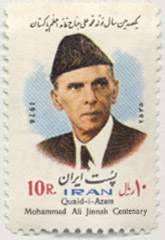

Pakistan 100 Rupees 1976 VF
Front: Muhammad Ali Jinnah
Back: Islamia College in Peshawar
Muhammad Ali Jinnah (December 25, 1876 – September 11, 1948), a 20th century politician and statesman, is regarded as the founder of Pakistan. He served as leader of The Muslim League and Pakistan's first Governor-General. He is officially known in Pakistan as Quaid-i-Azam and Baba-e-Qaum ("Father of the Nation"). His birthday is a national holiday in Pakistan. Jinnah rose to prominence in the Indian National Congress initially expounding ideas of Hindu-Muslim unity and helping shape the 1916 Lucknow Pact between the Muslim League and the Indian National Congress; he also became a key leader in the All India Home Rule League. He proposed a fourteen-point constitutional reform plan to safeguard the political rights of Muslims in a self-governing India.
Jinnah, advocating the Two-Nation Theory, embraced the goal of creating a separate state for Muslims as per the Lahore Resolution. The League won most reserved Muslim seats in the elections of 1946. After the British and Congress backed out of the Cabinet Mission Plan Jinnah called for a Direct Action Day to achieve the formation of Pakistan. The direct action by the Muslim League and its Volunteer Corps, resulted in massive rioting in Calcutta between Muslims and Hindus/Sikhs. As the Indian National Congress and Muslim League failed to reach a power sharing formula for united India, it prompted both the parties and the British to agree to independence of Pakistan and India. As the first Governor-General of Pakistan, Jinnah led efforts to rehabilitate millions of refugees, and to frame national policies on foreign affairs, security and economic development. He died a year after Pakistan's formation in September 1948. Read more
 An Iranian stamp commemorating the centenary of Mohammad Ali Jinnah, printed in 1976.
An Iranian stamp commemorating the centenary of Mohammad Ali Jinnah, printed in 1976.Information and Image Obtained From Wikipedia, the free encyclopedia
No comments:
Post a Comment